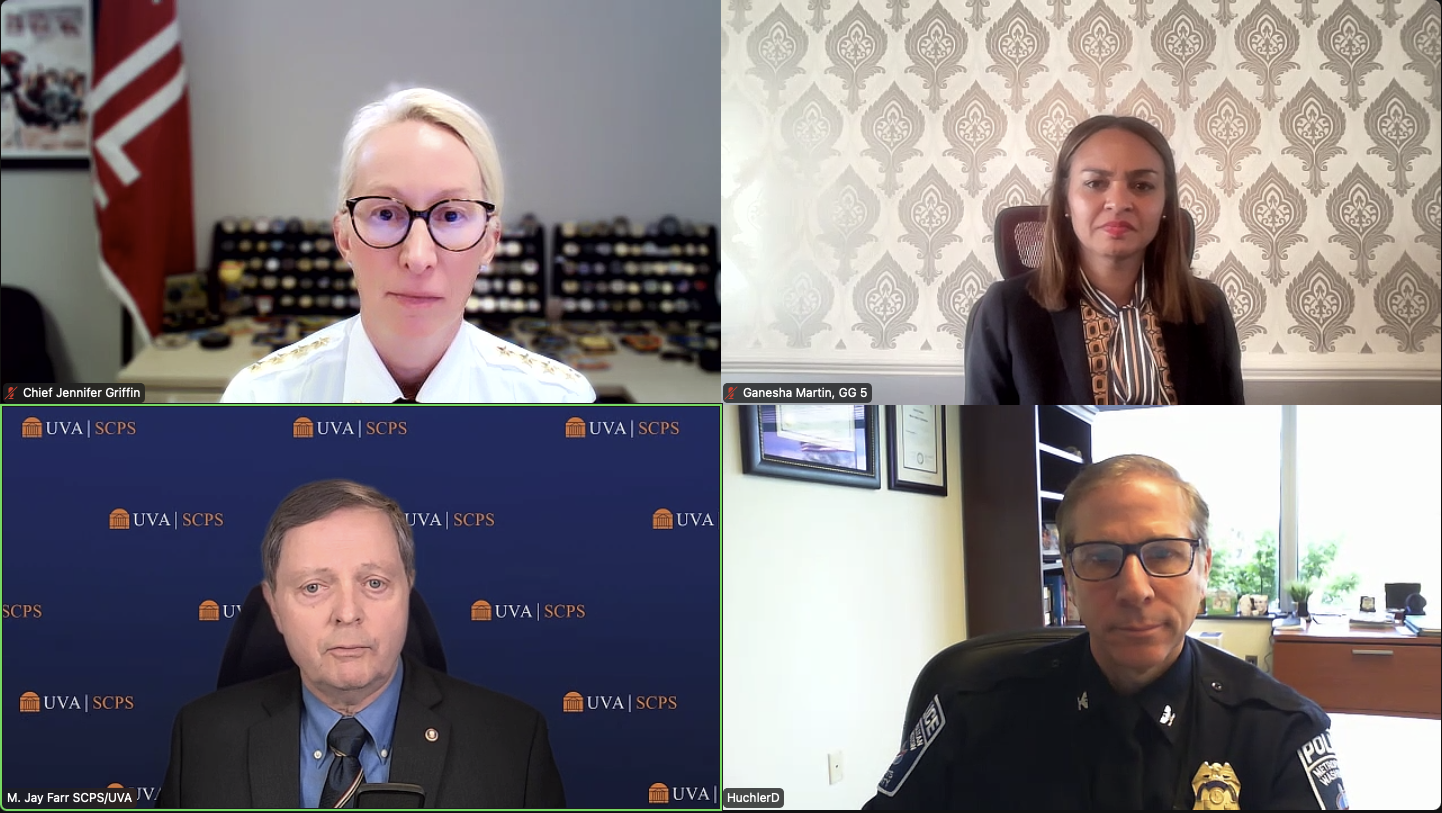Public Safety Experts Explore Strategies for Fostering Trust, Transparency, and Collaboration Policing
Last month, the UVA Center for Public Safety and Justice hosted a webinar on “Community Policing and Building Public Trust.” During this session, a distinguished panel of law enforcement professionals shared insights on fostering trust and collaboration. The panel was moderated by M. Jay Farr, former Chief of Police and Assistant Professor at UVA, and it included the following participants:
- Chief David Huchler of the Metropolitan Washington Airports Authority
- Ganesha Martin of Mark43
- Dr. Jennifer Griffin of Temple University
Chief Huchler emphasized that community policing transcends geographic boundaries. “Community itself transcends any geographically defined area,” he said, noting that even in a transient environment like an airport, the principles of community policing remain relevant. “We have a business community on steroids,” he explained, referencing the diverse stakeholders at Reagan National and Dulles International Airports. Huchler highlighted the importance of proactive engagement, feedback mechanisms and adapting traditional policing strategies to unique environments.
Drawing from her experience in Baltimore, Ganesha Martin challenged the conventional understanding of community policing. “I actually don’t like saying the [phrase] anymore,” she said. “It means so many different things to so many people.” Martin advocated for redefining community policing with measurable outcomes, stating, “We need to come up with some metrics that matter… the same way that we have metrics that align with our crime strategies.”
Building Trust Through Transparency and Engagement
In addition, Dr. Jennifer Griffin shared how Temple University has embraced a holistic approach to public safety. “We’ve reorganized the entire department,” she said, highlighting the creation of an engagement unit and a $32 million budget dedicated to safety initiatives. Griffin emphasized the importance of consistency and presence: “You can’t come in and run a great program and then disappear for the next six months.”
Griffin also discussed the university’s efforts to balance enforcement with creating a welcoming academic environment. “Law enforcement should always be impartial,” she said. “My job is to create a safe space for groups to protest.” She credited Temple’s collaborative approach - bringing in administrators, student affairs and faith leaders - for maintaining peaceful demonstrations and fostering trust.
Martin echoed the importance of showing up and owning past mistakes. Reflecting on her time in Baltimore following the Freddie Gray incident, she said, “To the extent that you can… come in and say, ‘Hey, we misstepped,’ I think is important.” She also stressed the value of intermediaries: trusted community members who can bridge the gap between police and residents.
Technology, Training, and the Future of Public Safety
The panelists also explored the role of technology and data in modern policing. Chief Huchler described how his department collaborates with George Mason University to analyze enforcement strategies and improve deployment. “We use concentric circles for security,” he explained, referencing a layered approach that includes traffic, metro entryways, and airside operations. “Procedural justice is the foundational element in everything we do.”
Griffin highlighted Temple’s use of technology as a force multiplier, including 1,500 cameras, gun detection systems, and license plate readers. “We’re very transparent,” she said. “We want people to know there’s a lot of cameras.” She emphasized that technology should support—not replace—human engagement.
Martin concluded with a call for human-centered policing. “We’ve got to take care of the cops before they can go out and take care of the traumatized community,” she said. She advocated for trauma-informed training and using data to measure respectful interactions. “How do we continue to build trust with our communities without alienating our officers?” she asked, framing it as one of the most pressing challenges ahead.


